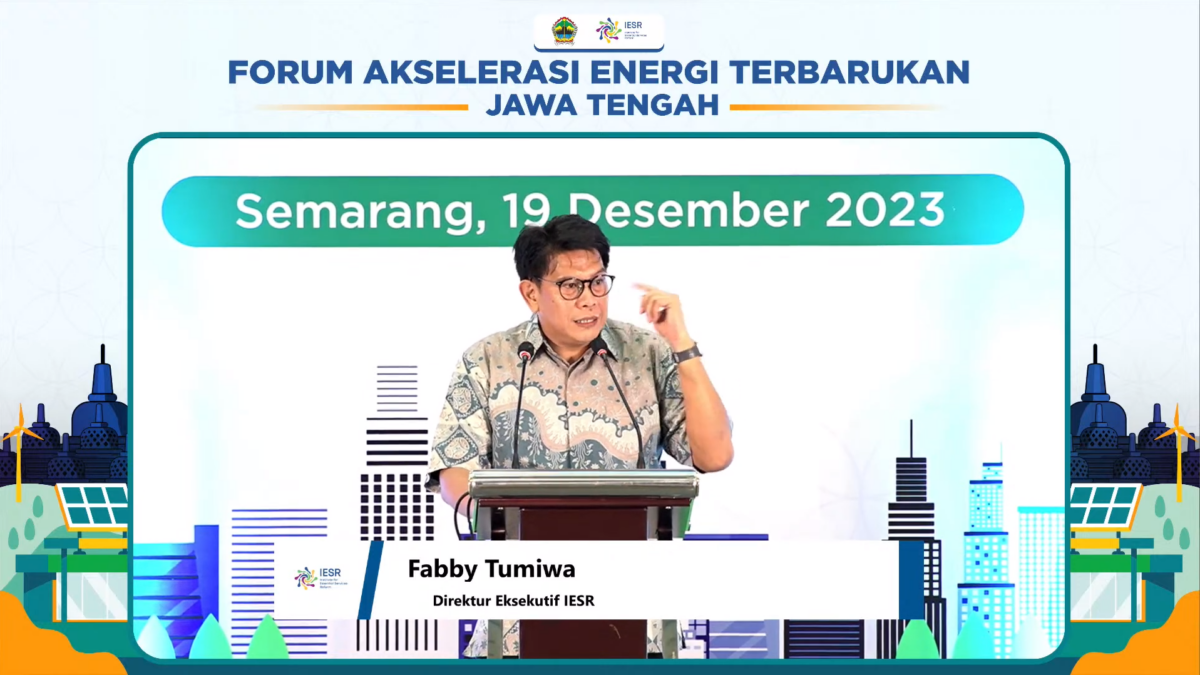Semarang, 19 December 2023 – The annual Climate Summit (Summit) held in Dubai in November – December 2023 resulted in a number of global agreements, one of which was an agreement by 118 countries to transition and abandon fossil fuels. This agreement was born partly due to pressure from countries experiencing the impacts of climate change. 2023 was recorded as the hottest year in history.
In his opening speech for the Central Java Renewable Energy Acceleration Forum, Fabby Tumiwa, Executive Director of the Institute for Essential Services Reform (IESR) stated that the simplest thing to ensure the energy transition occurs is to add renewable energy capacity to the energy mix. To massively add renewable energy capacity requires significant investment costs and comprehensive enabling conditions.
“The complex and expensive energy transition can only occur if there are enabling conditions, including rules and regulations, support for public and private partnerships, community initiatives, and investment. Currently, to achieve the RUED target, regional funding capacity is still insufficient, so it is necessary to encourage investment,” said Fabby.
Head of the Central Java Province Energy and Mineral Resources Service, Boedyo Dharmawan, said that his party had contributed to achieving the target of 23% of the national renewable energy mix by 2025.
“In 2023, Central Java Province achieved a regional renewable energy mix of 21.2%. We will continue to encourage this capacity addition in the coming years. Apart from that, we also encourage energy conservation practices through energy and water saving movements, in government agencies and also in business entities, including energy audits,” he said.
Tavip Rubiyanto, Middle Expert Policy Analyst on Energy Substances and Mineral Resources, Directorate of SUPD I, Directorate General of Regional Development, Ministry of Home Affairs, highlighted the role of the entire OPD sector in matters of managing renewable energy in the regions.
“From the start, the ESDM Service had to coordinate with related agencies such as Environment, Transportation and Planning Services. So that RUED can be integrated into the RPJMD. “It does take effort to convince and provide understanding for Bappeda to support this EBT target, but that is what must be done,” said Tavip.
In terms of investment trends, Indonesia is becoming a global investment destination even though currently there are still several investment challenges. This was conveyed by Purwo Wiyatmanto, Head of Sub-Directorate for Promotion Strategy Analyst/ Middle Expert Investment Management, Ministry of Investment/BKPM.
“Investment in the new renewable energy sector is also increasing in demand. The increasing need for energy is also accompanied by an increasing share of renewable energy. Indonesia’s new renewable energy share of around 14.5% (below the ASEAN average) is a challenge in itself, but this is also an opportunity for growth,” he said.
From an industrial perspective, there is actually a need for clean electricity produced by sustainable energy sources. This need becomes stronger if an industry enters the global brand supply chain. Rudi Cahyono, Energy Carbon Manager, PT Selalu Cinta Indonesia (SCI) said this pressure was because his party was included in the supply chain of the footwear industry which is marketed globally.
“We are committed to using 100% renewable energy by 2030 as a consequence of our entry into the global supply chain. By 2024, the target is that we can reduce our carbon footprint by 99%,” said Rudi.
Sakina Rosellasari, Head of the Central Java Province One Stop Investment and Integrated Services Service (PMPTSP), added that her agency continues to actively promote projects that are ready to be developed by investors.
“Central Java is open to green investment, not only labor intensive, but also green economic management,” he said.
Apart from investment on an industrial scale, the use of renewable energy at the community level also needs to continue to be encouraged. Yanto, Head of Banyuroto Village (one of the Energy Independent Villages), Magelang Regency, stated that there is a lot of renewable energy potential on a small scale that can be utilized on a communal scale with the support of the local government.
“Future plans, we, the village government, are trying to increase the amount of biogas in the community, around 100 biogas digesters at least in the next 5 years and budget it in the (village fund) APBDes and are ready to collaborate with related agencies, campuses and other parties,” he said.
With 34 biogas digesters spread throughout almost the entire Banyuroto Village area, this digester has helped the welfare of the community since 2007, starting from cooking needs (reducing household cost), lighting without converters and zero waste from the results of the biogas process (solid and liquid fertilizer, bioslurry).
In 2023, the national government will make a number of important notes in the development of renewable energy. The revision of the National Energy Policy (KEN) document and the inauguration of the Cirata Floating PLTS are among the major points in the energy transition process this year.
Adimas Pradityo, Business and Commerce Development Manager, PLN Nusantara Power said that in 2024 there will be PLTS development in Central Java with a capacity of 140 MW in several locations including Batang and Pemalang. Adimas also shared PLN Nusantara Power’s experience in developing the Cirata floating PLTS.
“(One of) the challenges is explaining the PLTS concept to regulators. We really have a bottom up approach in licensing the development of the Cirata Floating PLTS,” he said.

